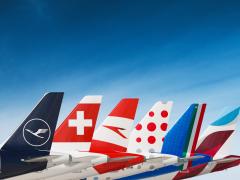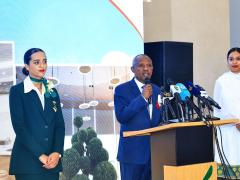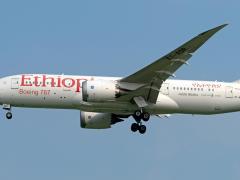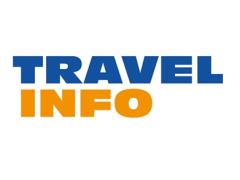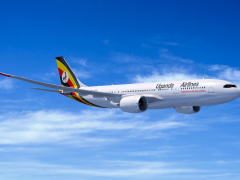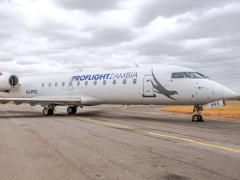Mobile – agents must join
the conversation
MOBILE technology has
become increasingly
important for travel
agents, primarily because
of the way it enables them
to connect with travellers
on their level, industry
professionals say.
According to the recent
findings of a World Travel
Market Global Trends Report,
more than 40% of online
traffic related to travel
comes from mobile devices;
57% of business travellers
use a mobile device to book
travel; and 44% of travellers
use their phones to research
travel while they're actually
travelling.
In line with these findings,
Giles Clinton, partner at
Checkout Travel, says,
on average, 70-80% of
Checkout Travel’s enquiries
and searches are done off
a tablet or smart phone. “I
think that mobile technology
is going to become the
main way people source
and search for travel in the
future.”
“Research highlights
the importance of mobile
technology to the travel
trade,” says Melissa Storey,
executive head: strategy,
development & marketing
at First Car Rental. She
adds that advances in
mobile technology are
revolutionising the ways in
which leisure and business
travellers plan, research and
book travel.
“To remain competitive,
companies need to
understand their customers’
buying habits and evolve
their systems in accordance
with the advances in
technology.”
Don’t be left behind
Pine Nel, senior manager
integrated solutions for
Carlson Wagonlit Travel in
South Africa, says: “Mobile
technology empowers
the traveller; it allows
for anywhere real-time
interaction throughout the
entire booking process.
“From pre-trip profile
management and live
itinerary updates through to
location-driven and on-themove
tools like maps,
point-to-point transfers
and restaurant guides, the
traveller is now firmly in the
driver’s seat.”
In light of this, travel
agents must be part of the
mobile research process,
providing curated expert
advice at every step of the
planning and buying process,
says Norm Rose, US-based
travel technology expert.
He agrees that the primary
change mobile brings to
the travel ecosystem is
an always-on and alwaysconnected
traveller who
wants relevant information
in line with their needs at
specific moments during
their trip and that mobile
is becoming the dominant
platform for all types of
travellers. “Travel agents
must be part of this mobile
conversation or they will be
left behind.”
Critical to your business
Mobile technology is very
much here to stay and
will become more and
more integrated into our
lives, comments George
Harb, Travelport’s regional
director for Southern Africa,
Zambia and Zimbabwe. He
says mobile technology
will continue to grow in
importance as more and
more travel agents look to it
for business solutions.
Mobile technology is
particularly important when
it comes to showcasing the
travel agent’s product to the
client, says Andrew Stark,
gm of Flight Centre. “I don’t
see expert consultants using
mobile phones to book
on behalf of customers. I
see customers using their
phones to search, compare,
enquire and book. It’s
another medium to push
product to consumers.”
Wally Gaynor, md of Club
Travel, agrees that it’s not
so much about the mobile
technology the consultant is
using but rather about which
mobile technology the client
is using to access what the
consultant is booking. “The
consultant makes a booking
on Amadeus and the client
uses the Amadeus Check
My Trip app to access their
itinerary and e-tickets,”
he explains.
At the end of the day,
mobile technology is critical
in any travel company’s
overall technology
solution, maintains Claude
Vankeirsbilck, chief sales
and marketing officer for
Tourvest Travel Services.
“It’s about listening to the
consumer’s needs, whether
corporate or leisure, and
responding adequately to
these needs. Those that
respond with solutions
will prosper in the years
to come.”
Stay one step ahead...
TRAVELLERS have become
increasingly savvy as they
have access to a large
number of devices and
products, says George
Harb. If the travel agent
wants to keep their edge,
they need to be able to
outsmart the client.
“While an agent is sitting
with a customer looking
for a hotel, it is likely the
traveller is also checking
on their mobile devices on
apps such as TripAdvisor
or SeatGuru to validate
the accuracy of the advice
the agent is giving them.
The traveller has access to
more data and information
than ever before. As such,
Travelport technology is
developed to ensure we
provide agents with access
to the information they
need to stay one step
ahead of the traveller,”
he says.
Harald Eisenächer, senior
vp Sabre for EMEA, agrees
and says that by deploying
technology services, travel
agents can get ahead of
their competition in the
South African market. He
advises agents to analyse
what their clients are
doing online to identify
trends. “Big data is the
differentiator for the
future.”
Harald says: “As
the world gets more
complex, it’s important
for technology to become
more flexible. As such, we
are changing our approach
by opening our platform
to outside innovators
to develop application
programme interfaces.
This is one way in which
innovation helps manage
and contain complexity.”
The opportunity lies with apps
THE development of
mobile travel apps is
a flourishing niche in
South Africa, according
to Melissa Storey.
“Mobile apps provide
an important avenue
for travel companies to
deliver excellent customer
service and develop
strong relationships with
customers.”
It is therefore not
surprising that most travel
agencies and consortiums
have started to explore
the possibilities of
developing apps for their
customers. Wally Gaynor
says Club Travel has
recently partnered with
a technology company to
develop an app that allows
corporate clients not only
to book flights, hotels, car
hire and even Uber but
also to authorise and get
authorisation for travel, and
to scan and record their
expenses while travelling.
“These features enable
them to get reimbursed
for spend while they are
still travelling. We feel it
will be a game changer in
corporate travel.”
Travelport is also
increasingly investing in
apps for the traveller.
George Harb says
Travelport’s consumerfacing
product, View Trip,
is constantly evolving to
meet traveller demands
and to allow for the
seamless interaction and
exchange of information
between the traveller and
the travel agent. “For
example, allowing an agent
to ‘push’ tailored traveller
suggestions to the traveller
while they are on their
trip, such as things for the
traveller to see and do, and
restaurants to visit, etc.”
Tech tailored for agents
ALTHOUGH most mobile
innovation is directed at
the traveller, travel agents
can also benefit from the
mobile revolution with
GDS technology providers
developing mobile systems
aimed specifically at travel
consultants.
George Harb says
Travelport has been
developing mobile
applications for the travel
agent for many years. “As
devices evolve and become
‘smarter’ with faster 4G
networks and the open
platform, the opportunity
and demand to develop
applications for the travel
trade has never been
greater.”
According to George,
Travelport Mobile Agent
has revolutionised the way
agents work by allowing
them to access the travel
commerce platform at any
time and place. “In the
past, if a passenger had an
issue, an urgent booking
requirement or wanted to
change their flight out of
hours, the travel consultant
would need their PC to
make these changes. If the
agent was not in the office
or at home, this created
huge complexity for them to
provide efficient customer
service and limited the
service offering the agent
could provide.”
George says the fact
that travel agents can
access the GDS on their
mobile phone means they
can offer new levels of
customer service while
also having huge flexibility
in how they work. “We
have instances of agents
who are out hiking or on
safari accessing our travel
commerce platform to
assist their customers.”
Sabre’s ‘Red Mobile
Workplace’ is another
solution that enables travel
agents to book and manage
travel for clients wherever,
whenever.
Service providers have
welcomed the development
of mobile apps for travel
agents saying this means
their business is open
through the travel agent
24/7. Melissa Storey says:
“First Car Rental is busy
with certification for Sabre
and Travelport. This will give
travel agents, worldwide,
real-time access to First Car
Rental’s booking portal and
vehicle rates and services.”
News Flash:Earn new commissions!
TRAVELPORT recently
announced that the
Ingresso Entertainment
Tickets plugin is now
accessible to travel
agents via its pointof-sale
technology,
Travelport Smartpoint.
The plugin provides
agents with a simple
way to earn new
commissions by adding
theatre, attraction and
sightseeing products
worldwide to the travel
bookings they make
through Travelport
Smartpoint.
Did you know?
The latest version of Travelport’s Smartpoint product will be released
next month.
4 tech elements ITCs should
seek in a consortium
THE ITC sector of the travel
industry is thriving, with
an increasing number of
consortiums entering the
market. For prospective
ITCs wanting to join the
independent travel market,
the plethora of choice can be
quite daunting. TNW spoke
to industry leaders to find
out which technology ITC
candidates should look for
in a consortium to ensure
their needs will be taken care
of and that they maintain a
competitive edge.
1. End-to-end solutions
Claude Vankeirsbilck, says
it is important to have
technology at your fingertips
that has been developed with
the corporate customer, the
traveller, the travel booker
and the travel consultant in
mind. He adds that Tourvest
has recently developed a total
end-to-end travel management
solution, TravelIT. “The need to
integrate mobile technology in
our value propositions is being
driven by the customer and it
is very important for the travel
trade to meet this need.”
2. Easy access to
content
Wally Gaynor says it is
important for travel agents to
be able to publish content on
their own websites or apps.
That is why Club Travel has
developed a ‘next generation’
Intranet system that allows
ITCs and affiliate agents to do
a single search for both LCCs
and scheduled carriers on the
system. He says the system
will support Galileo, Amadeus,
Worldspan and Sabre and
adds that, on the hotel side,
travel agents will be able to do
a single search accessing over
90 suppliers, including GTA,
Expedia, Travelport Rooms and
More. ITCs will also be able
to access car hire, transfers,
attractions and packages.
3. Bespoke package
design
For Travel Counsellors, it is
important that the technology
it offers is designed with the
travel agent in mind. Travel
Counsellors’ own dedicated
tour operating system, Phenix,
is one such system and
allows ITCs to design holidays
for their clients. The system
offers accommodation options,
flights, transfers, excursions
and even LCC options.
The company decided to
build its own tour operator
system as a result of global
changes, which saw tour
operators cutting out agents,
says Kirsten Hughes, Travel
Counsellors’ commercial
director. She says travel
agents who design their own
packages for their clients are
able to significantly increase
their margins.
Mladen Lukic, gm of Travel
Counsellors in SA, says
although most consortiums
outsource technology, he
feels it is important to make
it an internal competence.
“We’re the only company
to truly invest in our Travel
Counsellors’ businesses.”
4. Solid support
Prospective ITCs should not
just be wowed by flashy apps,
but should look for a company
with a solid backing that has
stood the test of time in a
very competitive environment,
says Andrew Stark. “They also
need to look for a company
which has the best deals in
the market because no matter
how good your technology is, if
your deals are not relevant or
not very competitive, you will
not have demand.”
Connectivity remains
a challenge
IN SOUTH Africa, there are
still barriers to overcome
before mobile can become a
key channel for travel-related
research and purchases,
says Melissa Storey. These
include the high costs of
mobile data, lack of WiFi and
3G/4G coverage in some
areas – specifically rural – as
well as users’ reluctance to
embrace new technology,
especially when it comes to
their data security concerns
regarding mobile payment
systems. “In addition, mobile
app and responsive website
sophistication is still lagging,
resulting in users losing faith
in the mobile product due
to a ‘bad’ experience with
outdated technology,” Melissa
adds.
However, mobile phone
usage is increasing and
will continue to do so. The
South African Mobile Report
published in 2014 by IAB
South Africa, which addresses
smartphone usage, showed
that most South Africans
(80%) use their smartphones
to access the Internet.
Separate research by World
Wide Worx shows that the
app has become the single
most significant tool driving
the mobile economy in South
Africa – the use of mobile
apps has increased from
24% of adult cellphone
users in mid-2012 to 43%
in late 2013.
First Car Rental enhances
online booking
FIRST Car Rental has
recently developed and
launched a responsive
website that will make
booking a car simpler and
faster across all platforms
for all its leisure and
corporate customers.
Melissa Storey says
travel agents will soon
be able to join in the
experience as First Car
Rental has adapted the
same approach to its
Weblink booking tool.
The website, and soon
Weblink, automatically
adjusts to fit any screen
size – whether mobile
phone, tablet or desktop
PC. “The website and
Weblink form part of First
Car Rental’s commitment
to provide customers
with a simple, fast and
streamlined process that
integrates seamlessly
across all channels –
whether that’s on the
phone, in branch, via
laptop or from a mobile
device.”
Designing your
own website?
DIGITALTRIP has a wide range
of innovations for 2015 that
can provide travel agents
building their own websites
with a definite edge over their
competitors.
Giles Clinton, Digitaltrip
sales agent for Africa, says
agents can give their website
the ‘wow’ factor with the new
interactive Metro Grid. They
can choose from three web
layouts, then simply add text
and images and link it to their
pages and special offers.
Digitaltrip now also allows
simplified searches with
a new search box that
gives customers a simple
way to search for flights,
accommodation, car hire,
transfers, attractions and
more. “Travel agents have
full control of the tabs,
which can be styled using
the site branding tool. They
can personalise their search
box even further with default
origin, location, date and trip
duration or they can use their
own custom lists,” says Giles.
Improving the traveller experience
WHAT is driving growth
in travel? This was a key
question posed at Sabre’s
Technology and Innovation
Celebration held on
June 8 at the company’s
new offices in Fourways.
The conversation
focused on the trend
towards consumerisation
and how this is strongly
linked to the proliferation
of mobile. Sabre’s Harald
Eisenacher, pointed out
that mobile enabled a
more personalised travel
experience – increasingly
in demand from travellers
– as is evidenced by the
fact that ancillaries are
a US$49bn (R607bn)
industry. “Mobile
personalises travel and
therefore helps drive
revenue.”
He also raised the
topic of big data,
commenting that through
the combination of
both structured and
unstructured data, travel
suppliers would be able
to predict the demand of
consumers. “Travellers
produce three times as
much data as the next
person.”
Technological
innovations such as
geolocation services, big
data and virtual reality
are all tools that the
travel industry will soon
be able to use to upsell
more effectively and at
the same time improve
the traveller experience.
In fact, Sabre provided
guests with a sneak
preview of some of its
new technologies that are
under development.
The technology works
on the premise of offering
a product or upgrade to
the traveller at that point
during their travels when
they are most likely to
need it. For example, a
businessman who, prior
to his flight opted for the
cheaper economy-class
ticket, might very well
regret his choice as his
journey begins and he
finds himself in a very
cramped and noisy space
with a screaming child in
the row in front of him.
At this point a message
pops up on his mobile,
offering him a last chance
to upgrade.
Another example would
be a passenger en route
to the airport, where there
is a lengthy queue at
the check-in. The airline,
noting the possible
delay, will be able to
send a message to the
passenger warning them
of the hold-up and offer a
fast-track pass.
These emerging
technologies will help
travel professionals
to take advantage of
the growing number of
smartphone users –
Sabre estimates this is
growing at one million
new users every day and
caters more effectively
to the next generation of
travellers.


